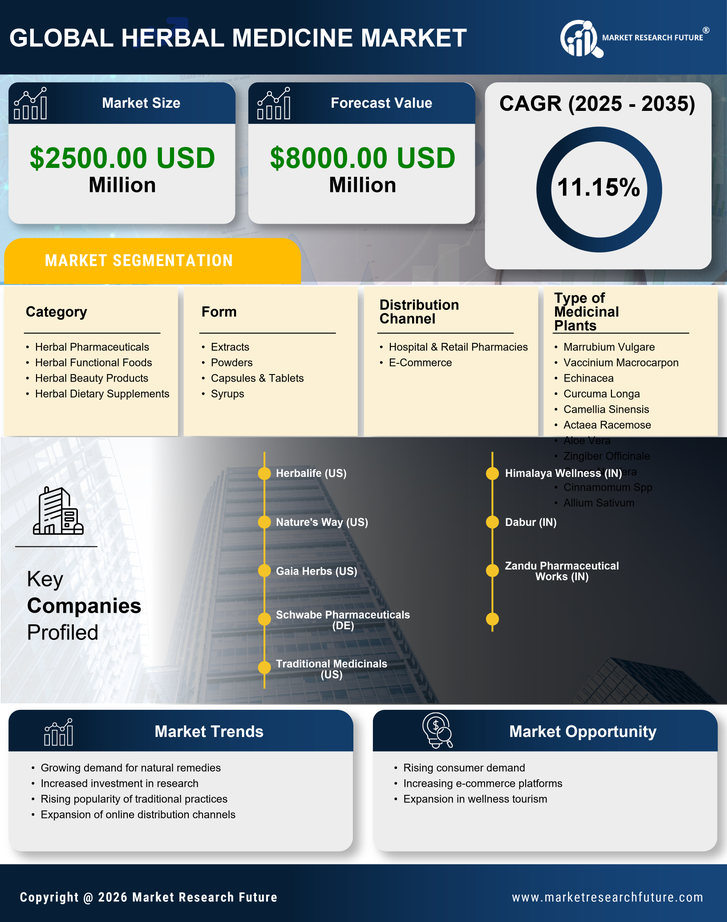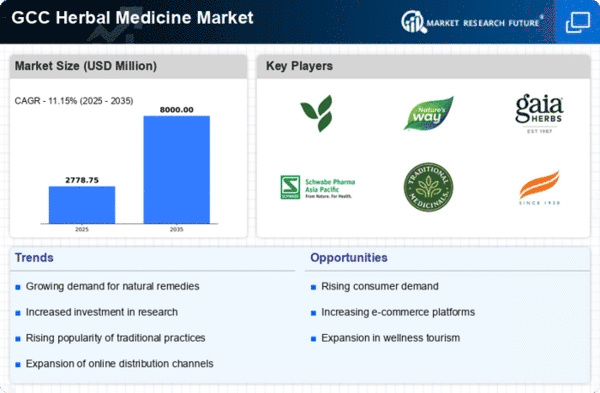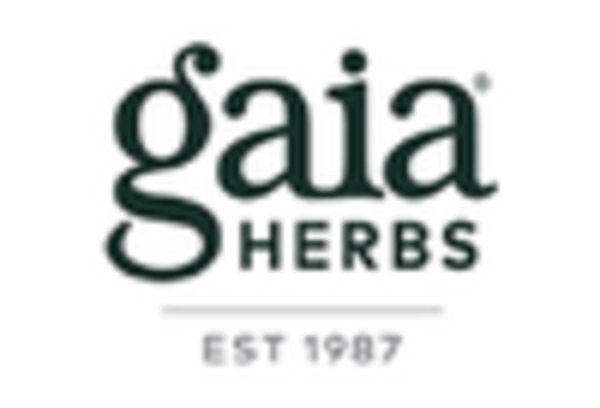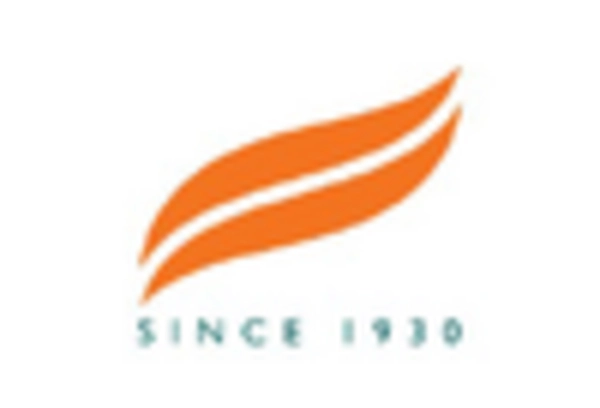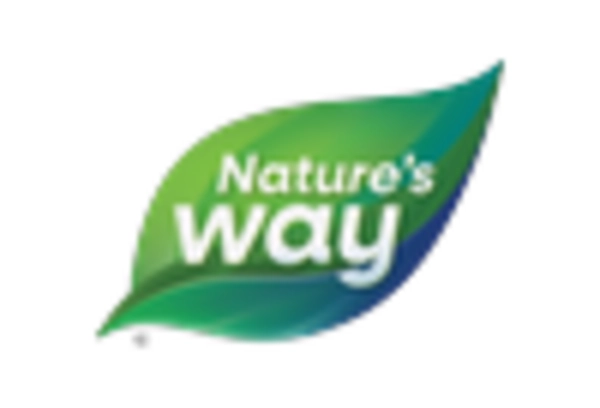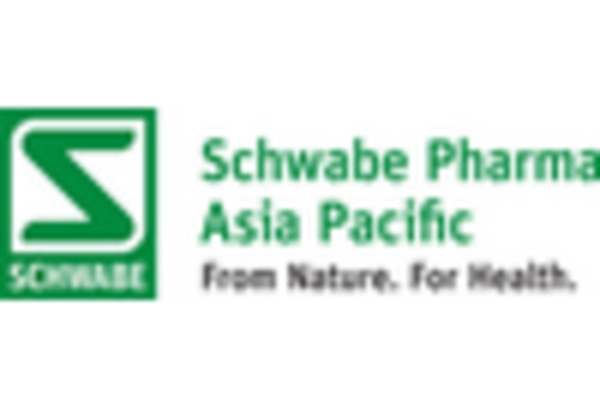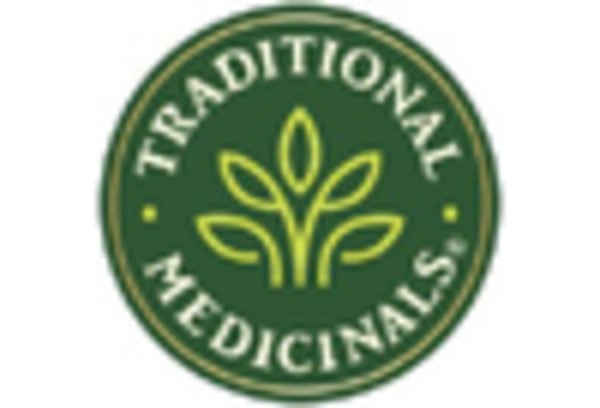Growing Health Consciousness
The increasing awareness of health and wellness among consumers in the GCC region appears to be a primary driver for the herbal medicine market. As individuals become more informed about the benefits of natural remedies, there is a noticeable shift towards herbal products. This trend is reflected in market data, indicating that the herbal medicine market was projected to grow at a CAGR of approximately 8% from 2025 to 2030.. Consumers are increasingly seeking alternatives to synthetic pharmaceuticals, which may lead to a greater acceptance of herbal solutions. This growing health consciousness is likely to encourage manufacturers to innovate and expand their product lines, thereby enhancing the overall appeal of the herbal medicine market. Furthermore, the rise in preventive healthcare practices is expected to further bolster demand for herbal products, as consumers prioritize holistic approaches to health.
Expansion of Distribution Channels
The expansion of distribution channels is likely to play a pivotal role in the growth of the herbal medicine market in the GCC. With the rise of e-commerce and online retail platforms, consumers now have greater access to a diverse range of herbal products. This shift in distribution is expected to enhance market visibility and availability, potentially driving sales. Data suggests that online sales of herbal products have increased by approximately 25% in the past year, indicating a growing preference for convenient shopping options. Additionally, traditional retail outlets are also adapting by incorporating herbal products into their offerings, further broadening consumer access. This multi-channel approach may facilitate the growth of the herbal medicine market, as it caters to the evolving preferences of consumers who seek both convenience and variety in their purchasing decisions.
Cultural Acceptance of Herbal Remedies
Cultural factors play a crucial role in shaping the herbal medicine market in the GCC. The region's rich history of traditional medicine and herbal practices fosters a strong acceptance of these remedies among consumers. This cultural affinity for herbal solutions is likely to drive demand, as individuals seek products that resonate with their heritage. Market data indicates that approximately 60% of consumers in the GCC prefer herbal remedies over conventional pharmaceuticals for certain ailments. This preference is expected to sustain the growth of the herbal medicine market, as manufacturers tailor their offerings to align with cultural values. Additionally, the integration of herbal products into modern healthcare practices may further enhance their acceptance, creating a synergistic relationship between tradition and contemporary health solutions.
Regulatory Support for Herbal Products
Regulatory frameworks in the GCC region are evolving to support the herbal medicine market, which may significantly impact its growth trajectory. Governments are increasingly recognizing the importance of traditional medicine and herbal products, leading to the establishment of guidelines that ensure safety and efficacy. This regulatory support could enhance consumer trust in herbal products, potentially driving sales. For instance, the introduction of quality control measures and certification processes may encourage more manufacturers to enter the market. As a result, the herbal medicine market could witness a surge in product offerings that meet regulatory standards. This trend suggests that as regulations become more favorable, the market may expand, attracting both local and international players who are keen to capitalize on the growing demand for herbal solutions.
Rising Popularity of Preventive Healthcare
The increasing focus on preventive healthcare in the GCC region is emerging as a significant driver for the herbal medicine market. As consumers become more proactive about their health, there is a growing inclination towards natural remedies that promote wellness and prevent illness. This trend is reflected in Market Research Future, which suggests that the herbal medicine market is expected to experience a growth rate of around 7% annually over the next five years.. Consumers are likely to seek herbal products that support immune function, digestive health, and overall vitality. This shift towards preventive measures may encourage manufacturers to develop innovative herbal formulations that cater to these health-conscious consumers. Consequently, the herbal medicine market may benefit from this trend, as it aligns with the broader movement towards holistic health and wellness.
